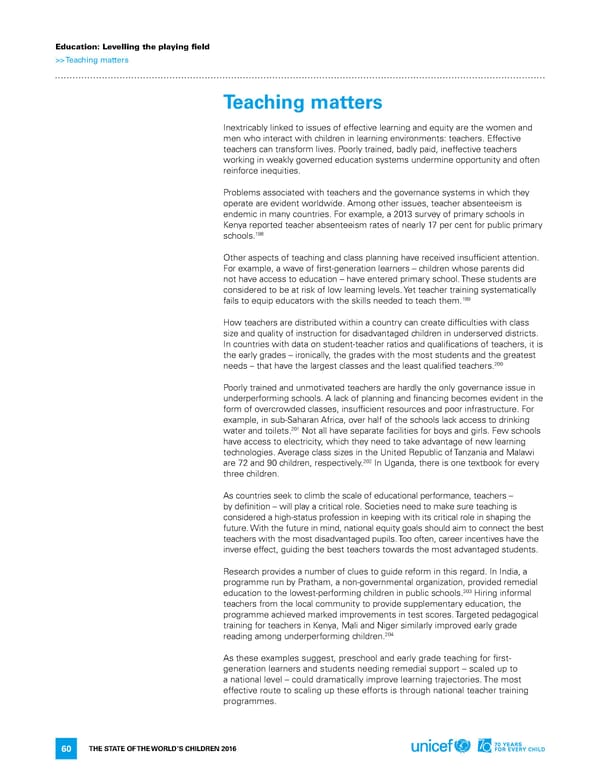Education: Levelling the playing field >> Teaching matters Teaching matters inextricably linked to issues of effective learning and equity are the women and men who interact with children in learning environments: teachers. effective teachers can transform lives. Poorly trained, badly paid, ineffective teachers working in weakly governed education systems undermine opportunity and often reinforce inequities. Problems associated with teachers and the governance systems in which they operate are evident worldwide. among other issues, teacher absenteeism is endemic in many countries. for example, a 2013 survey of primary schools in Kenya reported teacher absenteeism rates of nearly 17 per cent for public primary 198 schools. other aspects of teaching and class planning have received insufficient attention. for example, a wave of first-generation learners – children whose parents did not have access to education – have entered primary school. These students are considered to be at risk of low learning levels. Yet teacher training systematically fails to equip educators with the skills needed to teach them.199 how teachers are distributed within a country can create difficulties with class size and quality of instruction for disadvantaged children in underserved districts. in countries with data on student-teacher ratios and qualifications of teachers, it is the early grades – ironically, the grades with the most students and the greatest needs – that have the largest classes and the least qualified teachers.200 Poorly trained and unmotivated teachers are hardly the only governance issue in underperforming schools. a lack of planning and financing becomes evident in the form of overcrowded classes, insufficient resources and poor infrastructure. for example, in sub-Saharan africa, over half of the schools lack access to drinking water and toilets.201 not all have separate facilities for boys and girls. few schools have access to electricity, which they need to take advantage of new learning technologies. average class sizes in the United republic of Tanzania and Malawi are 72 and 90 children, respectively.202 in Uganda, there is one textbook for every three children. as countries seek to climb the scale of educational performance, teachers – by definition – will play a critical role. Societies need to make sure teaching is considered a high-status profession in keeping with its critical role in shaping the future. With the future in mind, national equity goals should aim to connect the best teachers with the most disadvantaged pupils. Too often, career incentives have the inverse effect, guiding the best teachers towards the most advantaged students. research provides a number of clues to guide reform in this regard. in india, a programme run by Pratham, a non-governmental organization, provided remedial 203 education to the lowest-performing children in public schools. hiring informal teachers from the local community to provide supplementary education, the programme achieved marked improvements in test scores. Targeted pedagogical training for teachers in Kenya, Mali and niger similarly improved early grade 204 reading among underperforming children. as these examples suggest, preschool and early grade teaching for first- generation learners and students needing remedial support – scaled up to a national level – could dramatically improve learning trajectories. The most effective route to scaling up these efforts is through national teacher training programmes. The STaTe of The World’S Children 2016 60
 70 Years for Every Child Page 75 Page 77
70 Years for Every Child Page 75 Page 77